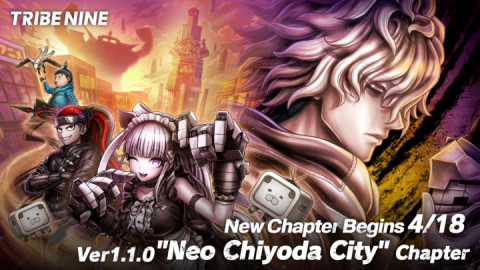*by Guest Reporter Jeff Yabumoto*
What does Overwatch’s KIT KAT rivalry weekend, Call of Duty, All Elite Wrestling, and The Titans Games all have in common? The answer is one man: Alex “Goldenboy” Mendez. This man may have had a short tenure as a professional gamer, but he exploded onto the scene as a commentator. Seriously, look at his 2018 retrospective and the sheer number of events he worked.
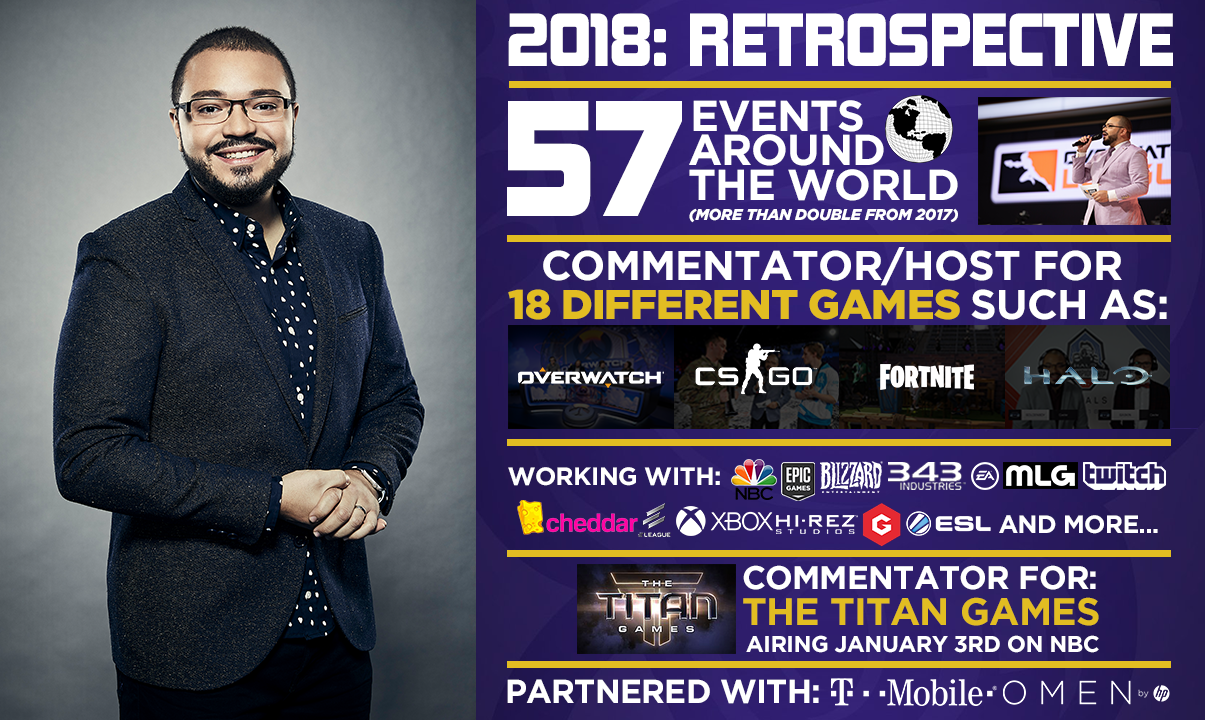
I reached out to Goldenboy because I wanted to learn more about the man who can seemingly do it all. I wanted to learn about his background, his inspirations, how he got into the scene, and yes, even his favorite game.
Without further ado, since this piece is monstrous in size, here is my interview with Alex “Goldenboy” Mendez. I hope you enjoy reading it as much as I enjoyed conducting it.
I wanted to start off with a bit of your own background. Can you talk about growing up in the Bronx with your mother in a single-family household?
It was me, my brother, and my mother. We were in a good apartment. My mom was a pretty crafty lady so she was able to get us a good apartment in the Bronx for relatively cheap that at least gave us space.
Growing up, I had the advantage of having a mother who was just very involved in all stages of my life. Whether it was video games, sports, TV, or school, she was involved in all those areas. To this day, she claims she taught me Spanish, *laughs* but that didn’t really work.
My brother was also a huge influence for me. He’s the reason I got into gaming. If it wasn’t for him, I probably wouldn’t be in the world of gaming. I’m just very grateful to have those two people in my life. Ups and downs for sure, but I’m very grateful.
How did you brother pull you into the gaming world?
He was a Nintendo guy and owned a NES. He used to unplug everything so I wouldn’t mess up his game files, but every now and then, he would leave it connected and put in a game that he didn’t really care about. To me, it meant the world.
The first game I played was Batman for the Nintendo. It was a really hard game for a kid, but I’ll never forget it because I loved the Batman movie and he had this game that was Batman. It sounded like the movie and it hit me immediately.
Sometimes he would purposely leave the NES connected and walk out the room knowing that I would sneak into the room to play. He was pretty smart about that. That was how I was introduced to games.
Sounds like a great older brother, there.
Yeah, I mean, he thought I was a pain in the neck, for sure. I was the younger brother. At the end of the day, he played the role of older brother very well. He hit all the notes: being mad at the younger brother for “getting it easy," loving the younger brother with some tough love, and giving me the support I needed to discover video games the way that I did. I’m very grateful.
You had the dream of being on ESPN, was there someone specifically that inspired that dream?
No, actually, I just always viewed ESPN as a big deal. Because of that, I thought if there was a day esports could get on ESPN I would like to be one of the people that’s doing that. That was a goal I set for myself early on, especially when I was hearing the rumors that ESPN were investing into esports. I just always thought it was super cool.
The other part was that MLG used to do the ESPN Top 10 plays and Chris “Puckett” Puckett was the commentator for that. Puckett is a dear friend of mine, mentor, confidant, and I also just looked up to him as an individual doing this incredible thing that ESPN was famous for. Having that kind of inspiration really set me down the path I would eventually end up in, hosting the Overwatch League Grand Finals and seeing my name on ESPN.
What were the obstacles you saw for esports to be on prime time ESPN and you being on it?
The road was laid with obstacles. There was so much in my way for me to get to that point. The one thing I always did was just stay as positive as possible and maintained good friendships. There were bumps along the way for sure, but meeting and working with people that cared about this industry is what really brought us to that point.
The obstacles as far as esports on ESPN, is really just the people that look at video games on TV and then complain about it on Facebook. That’s always going to be a challenge for the generation previous to us, but I think that stigma goes away as time moves on, and as video game competitions have become more normalized I think that it will definitely not be an issue anymore.
That moment you had during the intro at the OWL Grand Finals, can you share what you were feeling in that moment as you were on stage?
The story of how that all came about is pretty great. I had no expectations going into it. We’ve seen esports events before, even ones at Barclays that didn’t sell out, and I just assumed we’d sell the first floor out and then half of the top.
During the pre-show, I did a hit at the top of the bleachers, sharing a story about how I went to watch Monday Night RAW and how Johnson came out and hit Rusev with a rock bottom and all that stuff, and it was pretty awesome.

I shared that story and I think a lot of people realized how much that event meant to me just as a proud New Yorker. I famously didn’t go to LA to work on the Overwatch League full-time because I wanted to grow New York esports, and most importantly, I wanted to be home with my family.
As I had made my way down to backstage, I was prepping for my opening where I would announce Philly and London, making sure I was going to get everything right. There were a lot of things going on in that moment.
As I was prepping, I wanted to take a look out at the crowd, just to see how we were looking. My colleague, Kevin our stage manager—the best damn stage manager in the world—he comes to me and goes:
“Alex, do me a solid and just stay back here. Just wait until you head out because we want to keep eyes on you."
Little did I know, he saw the amount of people that were out there. He wanted me to have that genuine moment. As I heard the video play and the crowd, I just thought, damn, that sounds like a lot of people.
The only time I had ever gotten nervous was when I hosted the analyst desk at the Smite World Championship. We had a packed house at the Cobb Energy Centre in Atlanta. It was so powerful—the crowd and how they were chanting with the countdown. I was feeling the floor shake underneath me.
That’s kind of what happened here, except that floor was not a stage, it was solid floor. As soon as that sliding door opened up and I saw all those people, the reaction you saw from me was 100% genuine. I was just blown away. I couldn’t believe what I was witnessing.
And I’d be lying if I didn’t say a little pee didn’t come out. I was a little nervous, but then my brain just went into autopilot and I did the intro.

It’s definitely something that I don’t think many people get to do in their life, which is open a show in front of thousands of people like that. I give Blizzard credit, though, because going into the event I didn’t want to stage host. I wanted to resume my duties on the desk as I had been doing all season long.
However, Blizzard felt like I would be a good option for the stage and I’m glad I had the chance to do it because it’s something I’ll never forget for the rest of my life. It was amazing.
You mentioned in a stream afterwards that your dream was that your moment on prime time ESPN would inspire other kids from the hood to be inspired by that. How important is it not only for you, but for others to see someone like you on TV?
I think it’s important for many reasons. I don’t like to make it into a race or political thing, because that’s not what I’m about. When I said it, I think some people took it out of context and interpreted that only kids from the hood should be inspired. That’s not what I really meant.
What I meant was that any kid like me that came from a less than ideal background — single mother raising two kids, working multiple jobs, had no money to pay for a bunch of our things— somehow, someway, we made it through.
There are so many kids out there that are going through the exact same thing that I went through. There are so many kids going through that right now and I just hope that my actions just help those that are maybe in a rough spot in their life. That it will help them think to themselves that things will get better.
It doesn’t have to be hosting the stage for the OWL Grand Finals, or being a player, or talent, or anything really. It’s just about a struggle and recognizing that we all go through struggles. I go through struggles every single day as I do this job and travel by myself. I’m constantly on the road and it’s draining on the mind.
I just want to try and inspire someone and tell them that we all go through the ups and downs of life, but if I, a person who I feel doesn’t have a lot of talent, can somehow manage to make it work; can make this happen, then I think anyone is capable of doing anything they put their minds to so long as they’re a positive thinker and want to do good in this world. I think good things come to those people.
You also started out as a social worker and a competitor rather than the commentator you're known as now. What got you into social work?
I’ve always wanted to help people. I was a retail store clerk: I worked at GameStop, grocery stores, warehouses… a bunch of odd jobs. Then a friend of mine got a job at an HIV case management center and told me they were looking for entry-level people and that I should apply. I applied, using him as a reference, and thankfully you didn’t need a lot of experience to get in.
From there, I just kept on learning about the social and non-profit field. After that, I transitioned over to the Department of Labor, and also Workforce1, that was helping people find jobs. That was pretty stressful. You would have people come in and say they wanted to do X, but they didn’t have the experience or training to do it. So you would have to find ways to get them to that point. It was equal points rewarding as frustrating.
Then I got a job at Goodwill. It was probably one of my favorite places to work because I had the opportunity to work with people who had developmental disabilities. I got to help them succeed at work. I would go to their jobs and help them to understand how to do their job better.It would vary depending on the job. Each one came with its own unique challenges, but you had to wear many hats and understand many things to properly execute on this line of work.
The reason I left was because it felt like the job cared more about billing Medicaid than helping the people after a while. That really bugged me, because it seemed like no matter how high up on the chain you went, it was about profiting as much as possible from billing Medicaid. So when the opportunity came around for me to go to the IGN ProLeague, I felt like it was a no brainer. For once, I was going to chase something for myself and see how it goes.
It was a little selfish, which I’m not too proud of, but I’m happy because I was able to achieve a lot with that one decision to move out west and pursue the idea of commentary with IGN.
One last thing on social work, one of your goals is to start a program for inner-city youth to improve public speaking skills. Why is this important for you?
The idea has changed over the course of time, but it still is very much the same thing. I didn’t grow up with anyone telling me how to speak in front of a crowd or how to address people in the workplace.
When you grow in the Bronx, the reality is that the ghetto is all around you. You just become that. You adapt to that.
The person who taught me this stuff was my mother. My mother was the one who showed me how to speak to people in the workplace. She had never done public speaking or anything like that, and neither have I.
I think the reason I’m able to do it is because you have to be a little crazy, and I am a little crazy. I’m okay putting myself out there. You almost have to have no shame. Nowadays, in this generation, projecting a “cool” persona is so much more important than relaying a message. It’s cool to hate, it’s cool to be negative; that’s just not a good train of thought for a lot of these kids.
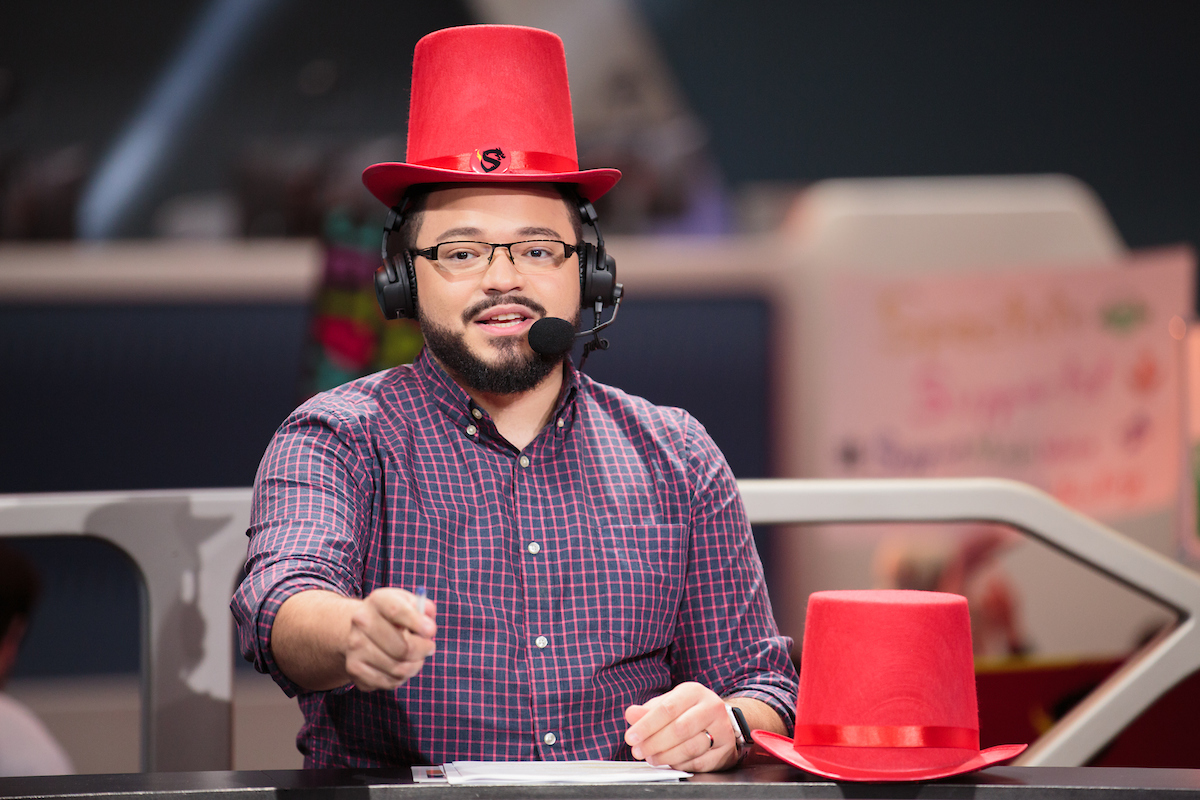
A lot of them think that public speaking isn’t cool. That getting in front of a crowd and leaving yourself open to the masses to judge you—they don’t want to do that. It will tarnish their “image.” I just approach life with I love what I do, I wear my feelings on my sleeve, and I’m okay with going up there and screwing up. Just the other day, when I did the Rainbow Six event, I mixed up two players’ names by mistake. It happens to the best of us.
Still, a lot of the Rainbow Six community was calling for my head. They wanted me fired and some people even issued very aggressive threats. I was just like, 'You know what man? It happens to the best of us.' I could have clammed up, but instead, I kept going.

Being able to pivot in those difficult situations is very important for kids to recognize and to be able to do. Public speaking is important. Being able to express yourself in an appropriate manner is important.
Another thing I’ve recognized as well is that, a lot of these institutions aren’t teaching kids how to use a computer, how to download things, how to type, or how to search the internet. That’s simply something that you are not taught in the inner-city. I want to, hopefully one day, be able to teach these kids how to speak and how to express themselves in an appropriate manner, but also how to properly utilize technology so they aren’t left behind. That’s important to me.
That’s awesome. I think that’s a really great goal. I do want to move onto esports now. You’ve said in the past that your love of pro wrestling has informed your own style of commentating. Are there specific inspirations or influences for you?
Yes! Pro wrestling has been a big part of my life ever since I was a kid. I would tune in every Monday night to watch Monday Night Wars between WCW Nitro and Monday Night Raw and Warzone, as it was called back then.
The thing about it was, I subconsciously was putting this information in my head. I was always enamored by the people in the ring performing these amazing feats of strength, but also by the people calling the commentary. Most importantly, the commentary of Jim Ross, who I had the pleasure of calling AEW Fyter Fest with a little while ago.
The man is a hero of mine. Just his way of relaying the story to the viewer: when Vince McMahon when do something a little dirty and unfair to Stone Cold Steve Austin, the way he would react… the passion was unbelievable.
I banked that information in the back of my head. I would also utilize the interviewers and see what Michael Cole would do. The way that he would hold a microphone and address the camera when he was talking. Again, information that I would bank in the back of my head.
When I got into esports, one of the things people didn’t like to do was interviews on stage. All commentators hated doing interviews on stage. I recognized that if they weren’t going to let me commentate Finals, I wanted to be a part of it in some other way.
I did my best to work on my interviewing skills and took those opportunities whenever I could. I interviewed the players, content creators, whoever it may have been. I was involved in a bunch of grand finals when I was working with MLG when I was doing Call of Duty just because I knew how to interview people.
I feel like that helped me out a lot. As I got into commentary, I always felt like esports was entertainment and not necessarily a sport. I know that may ruffle some feathers, but that’s not to say that entertainment can’t be competitive and all competitive integrity is lost, because I did the Titan Games and that was entertainment and very much a competition between two individuals.
That was my plan —to incorporate that excitement into my commentary. I didn’t care that I didn’t sound like every other commentator that was out there, I cared that I sounded like myself.
There is no character. There is no Goldenboy. Alex Mendez is Goldenboy. There is no difference there. Because of that, I felt like it really helped my commentary. When I was calling Call of Duty and I had one of my more famous calls— Noah "Nifty" Francis' clutch for ConqueR against team Envyus—that was passion.
I go back and look at that clip and see a million things I could have done ten times better, but I still think it’s a great clip because you can feel the desperation in the moment. That was the thing Jim Ross did so meticulously, was give you the idea of the desperation.
When I worked with him at Fyter Fest, we were calling Cody Rhodes versus Darbey Allin—that match went to a draw—and the way that Excalibur, my other co-commentator, and Jim Ross relayed the desperation of finishing the match before the draw hit… that’s the reason why I do what I do as a commentator and why my style is my style.
When you have that narrative painted for the viewer it becomes so much more entertaining. It’s been a guide for me for years, and I couldn’t thank those people enough for what they’ve done to influence my career.
Really quick, your favorite wrestler?
*laughs* I have a few. Right now, it would have to be Kenny Omega. I feel like he’s the best wrestler in the world. Then Cesaro would be another one. If I had to pick a third one, and I’m going to pick this one because I think he is a stand out performer, and gosh darn it he’s gonna get his time, it’s Xavier Woods from the WWE. I’m a big fan of his.
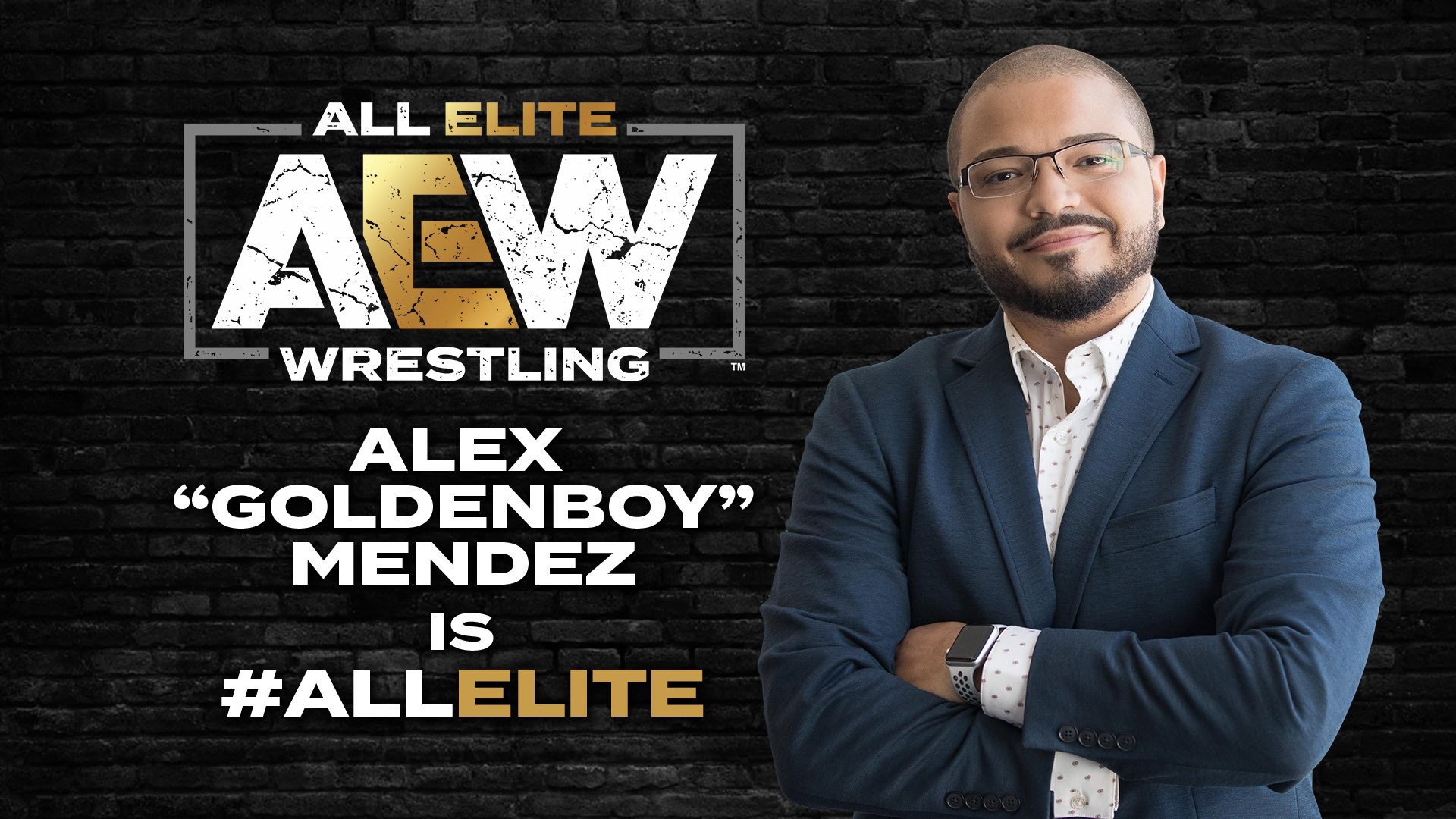
One thing that I found very impressive with your commentating is that you pick up games very fast, no matter what you’re commentating. You’ve done Overwatch; CoD; Fortnite; Rainbow Six; the list goes on — how do you do that? Picking up things so fast and having such an authority, that is.
That’s a question I get a lot. I have thought about it, because I had expected you’d ask that question.I think what it is, is that all games follow a thread. There are a lot of similarities between a variety of games. What it boils down to is how game sense works.
Game sense for every particular game is obviously different. For example, think about Fortnite and how players have to have that game sense on the rotation. They have to understand where the players are going to be above and below them.
Or when someone is attempting to take a wall and you put up a ramp to block that overtake. Those little things… that right there may sound particular to Fortnite, but it also works toward Call of Duty. You have to have that game sense to recognize where the cutoff is going to be for the player when he pulls the flag. Or how you’re going to drop smoke at this particular angle so that when you push through to take a hard point they can’t pre-fire you.
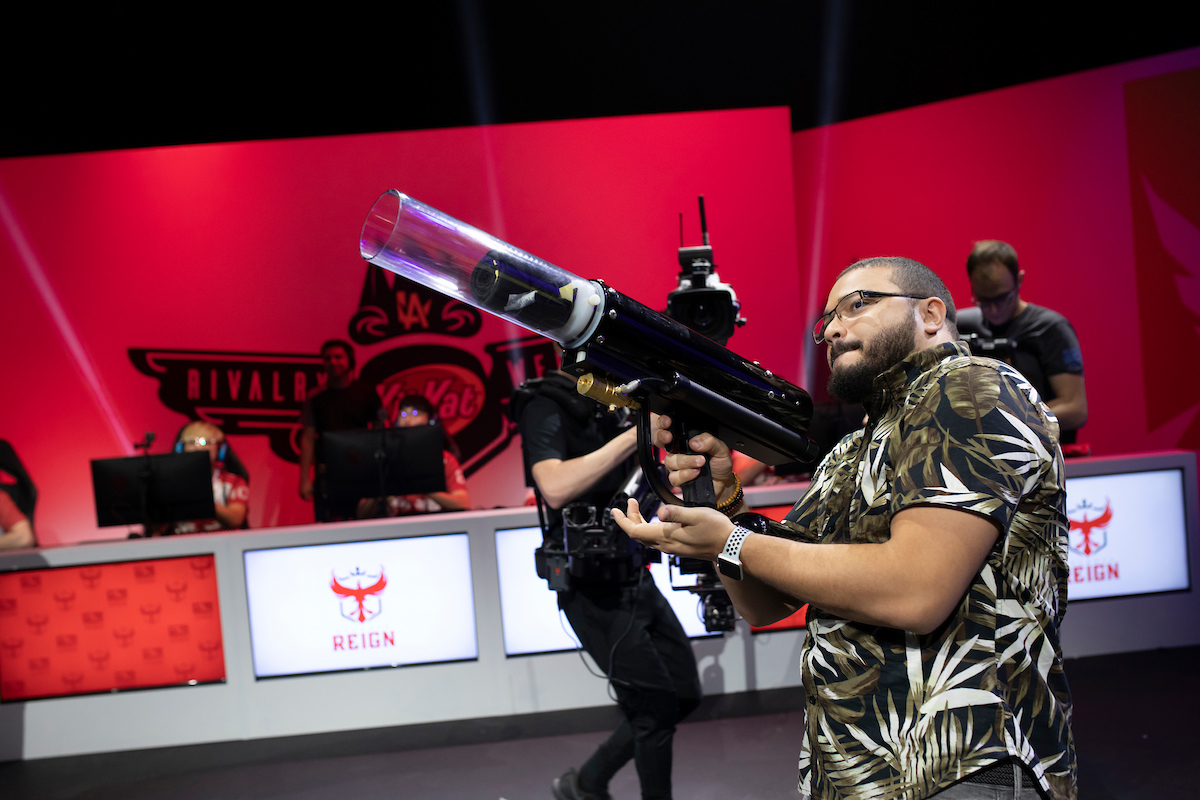
Or in Overwatch, you have to have that game sense to recognize when the dive is going to take place so that you can properly receive said dive and maneuver yourself appropriately. I just talked three different games there, but the underlying concept is game sense.
For me, those are the things that I have to ingest as a commentator and recognize the ways players are giving themselves an advantage to win in any particular scenario. Terminology tends to stay the same, and when you approach it with confidence people will believe what you’re saying. I’m not saying I’m lying or anything, but if you go into a situation saying:
“Well, you know… I think he might go in for the dive here…”
that doesn’t sound as confident as:
“You know what? I think he’s going to go in for the dive here.”
I know it's hard to convey my tone in a written article, so good luck, but there is a difference in how you can convey the same thing. It’s all in the wording and how you sound.
Think about Rainbow Six for example, I went into that as a casual fan of Rainbow Six esports. I’ve watched Pro League, I’ve watched some events, but in no world am I an expert on Rainbow Six. But I turned to my colleagues and said to them: “Hey, what are the things that you want to hear that I can pull out of a player so that it helps your analysis when you go back to the analyst desk?”
My colleagues would give me that information, and along the way I’m taking it all in, recognizing the good and bad plays, identifying the good picks and bans, etc. These are all the different layers you have to approach it from.
There’s a lot of movement of the mind, I like to say. That you kind of have to move pieces around, but eventually everything just clicks. Because of that, I’m able to leverage that ability to recognize what are some of the connections between all these games and how I can translate that to the viewer.
Now, here’s the big question, what is it you love most about the esports scene?
What I love most is the fact that we have so many options. I love that at any point in time, you can have a World Championship for DOTA 2, League of Legends, Fortnite, Call of Duty, Halo, Gears of War, Counterstrike, NBA2k, or Overwatch.
That’s just incredible. There are so many different flavors for so many people. I don’t feel like anyone is getting left out. I’m happy that people are putting in the investment. I’m happy that the NBA is investing in esports so that they can tell these stories and give their players a platform to shine.
I’m happy that Clash Royale exists as an esport. That those players who have put their blood, sweat, and tears into the game, even though people will look down upon them and say it’s a mobile game, have an opportunity to compete.
Same thing with Fortnite. So many people dog on Fortnite for so many different reasons, and some are justified and some aren’t, but I’m happy that millions of players had an opportunity to compete in a qualification tournament for $30 million dollars. That is unbelievable. That is so cool.
It truly is amazing. Yeah, sure, I had agreed with Ninja in a statement he made earlier about how kids have it easy these days. He’s not wrong. The barrier for entry in esports is so low now in comparison to what it was back then.
Back then, you had to invest in the best equipment and that equipment cost a lot of money. You had to travel to these events when air travel wasn’t nearly as cheap as it is now. Hotel prices — I used to be in a room with eight other people. We had to sneak people into the room because we had so many people staying inside one single room. I would sleep on the floor in order to compete at an MLG event.
I’m glad we did it. We learned, we grew, and we learned what not to do. I’m glad that we have so many other opportunities for these players to compete in and to chase their dreams without having to deal with those hardships. Maybe that’s the wrong way to think about it, but I’m a positive person.
I think it’s great. I think every generation always wants to make it easier for the generation that follows and I feel like that’s been accomplished here.
Yeah, for sure. I’m just excited for the future of esports and very hopeful that it will continue to grow and flourish, and that it will continue to include more and more people. I want to see kids from the inner-city compete in Counter Strike. I want to see kids from all walks of life have the opportunity to compete on the biggest stages of them all, and to invest their time into esports the way so many others have because it brings so much happiness to people. A little frustration, too, but mostly happiness.
Looking to the future, you’ve accomplished so much already, what else do you want to accomplish in esports over the next couple of years?
That’s a good question. I’ve done a lot. I’ve been very blessed and am grateful to have had the opportunities to do the things I’ve done. But really, I just want to continue doing a good job. So long as I can entertain people and they like what I’m putting out there, I’m okay with that.
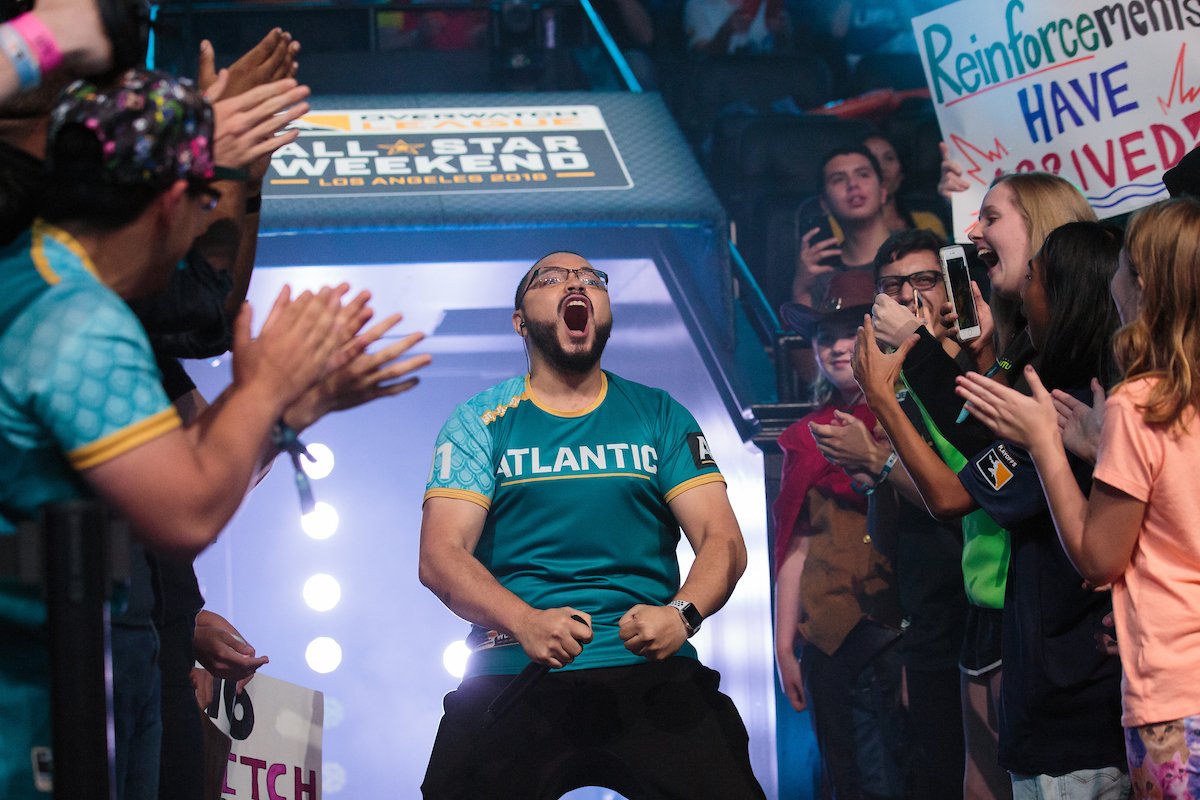
There doesn’t have to be a finish line. I think we can all just enjoy the ride. When I’m done, I’m done. I’ll have no regrets and I’m very happy about that. I don’t really have much of a definitive answer for you. I just want to keep doing the best I possibly can.
And if I’m doing a crap job, I want people to tell me I’m doing a crap job! Maybe that will push me to want to do better, because at the end of the day, all of our poop stinks. I always appreciate when people are honest and forthcoming, but also when they do so with compassion, kindness, and professionalism.
That’s what I want.
Now this is an unfair question, what is your favorite game?
That is an unfair question! Always and forever, my favorite game will be Halo: Combat Evolved. It was the reason why I got into first-person shooters. Like I said before, I didn’t grow up with a computer so I didn’t get to experience a lot of games other people did.
My first PC game that I worked in esports was Overwatch. I never had that opportunity to be able to learn and play with a keyboard and mouse. Now I’m playing with a keyboard and mouse because I’m lucky enough to do so, to be able to afford it.
Halo has just been a big part of my life for such a long time. I’ve read the books, I own toys, I own props, I’ve commentated Halo forever now. It is my passion. I was just commentating Halo at the UGC Halo Classic in Atlantic City last weekend.
I do it for passion, for love. Not to say I don’t love the other games, but Halo will forever be my baby. If I had pick a game that is right next to it, I would give it to Overwatch. Overwatch has changed my life in ways I could not imagine. Halo because I love the gameplay and I love the universe, but Overwatch because it’s helped me in my career.
And I have to do this, I’m sorry, but Call of Duty because it literally is the reason I have a career today.
No worries, it was an unfair question. As a last thing, is there anything you’d like to say to fans and readers out there?
Firstly, I’d like to thank my wife for being the positive support system in my life that I desperately need, especially when I’m sometimes at my worst mentally. And to my agency, CSA, who has done so much to help me out in my life and in my career.
The one thing I would tell people who are reading this, is be positive. It’s okay to talk about issues that you may be having, concerns that you have with developers and casters and players and all that stuff, but always remember, they are people too. They care about this work just as much as you care about the time you put into it as a viewer, as a fan, as a homie, as I like to say. I don’t believe I have fans, I believe we’re all just homies.
For me, it’s just about being positive. Be that individual that spreads that good message out there and help those that don’t understand it get to that point. Let’s not put people down. Let’s rise up and make everyone feel good.
Sort by:
Comments :0



